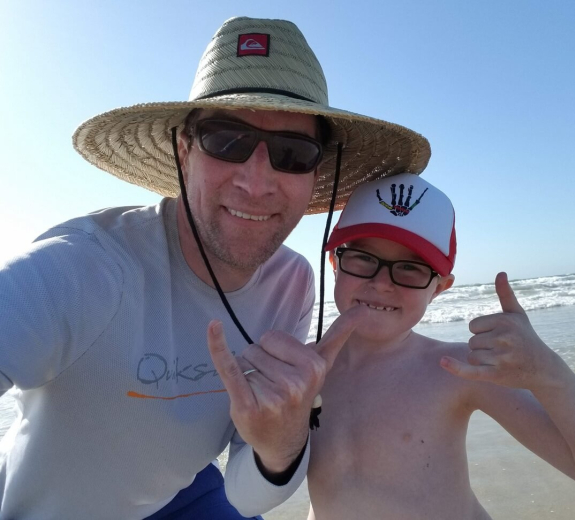Thatcher Heldring is a freelance writer and author focused on type 1 diabetes, environmental education, and other issues related to children and health. He has partnered with clients working on literacy, sustainable communities, youth leadership development, and health policy. He is also the author of four sports novels for young readers and the father of an 11-year-old T1 and a 14-year-old T3. You can reach Thatcher through his website at www.spitballinc.com.

Parenting a Child With T1D: This Might Sound Familiar
My son Peter was diagnosed with type 1 diabetes in 2013, just a few days before his third birthday. The years since have been a trial-by-fire learning experience. Poke-by-poke, carb-by-carb, my wife and I have become experts in managing a complicated chronic disease that our boy will never grow out of.
We have also become amateur PR experts. We’ve found the language we need to explain the disease to friends, family and people we meet in the park. Like any good publicists, we stay positive and we stay on point.
One message goes something like this: Peter has type 1 diabetes. That just means he needs to pay special attention to his blood sugar and sometimes needs to rest, eat or give himself a dose of insulin. Besides that, he is pretty much like any other kid.
That’s a simplification, but it’s basically true, and we stand by it.
It’s true enough for Peter. But sometimes I wonder how true it is for us.
Are we more or less like any other people in our world raising a child or is there something truly unique about our experience?
I’m not sure there is. While needles and medical devices and counting carbs and blood sugar levels beamed to cell phones are not a part of garden variety parenting, the truth is that – when you strip it all down – caring for a child with type 1 diabetes is not all that exotic.
Here are three examples.
We pay close attention to the food Peter eats.
We try to serve snacks and meals that balance carbs, fat and protein so Peter gets the nutrients he needs without his blood sugar rising or falling too quickly, which is basically what most caregivers do (maybe without realizing it). We just do a little more math, and the stakes are a little higher (low-blood sugars pose short-term risks while high-blood sugars are hard on the body over a lifetime). Otherwise, we’re not all that exceptional. Some families may be less conscious about nutrition than we are. Many are more aware. (Fun fact: kids with type 1 diabetes can eat anything their friends eat – they just need the right amount of insulin to convert the sugar into energy).
We choose activities that match his interests and needs.
Choosing a camp, a sport or an after-school activity for a kid is a pretty standard chore for any family. Once we sort for cost, location and timing, it basically comes down to perfect, good enough, or that would be a disaster (am I right, parents?). It’s the same for us. Most families probably have a unique filter for one of a million factors like allergies, physical ability, behavior, anxiety, asthma or culture. Ours just happens to be type 1 diabetes. So, we look for options that make it easiest to monitor his blood sugar. But, it’s really about listening to Peter’s interests and figuring out how to make it work. I bet that sounds familiar to a lot of parents and caregivers.
We have sleepless nights.
OK, this one may set us apart more. Type 1 diabetes is a 24/7/365 disease. Peter’s blood sugar doesn’t stop changing when he falls asleep. He is at constant risk of dangerous low blood sugars. Technology helps us track his body chemistry without waking him. Still, in a typical night, we’re up two or three times to check his status. Other nights can mean hours of lost sleep. In that sense, we’re feeling the same effect of sleep deprivation that wears down parents with infants. The difference is that type 1 diabetes is the newborn that never grows up.
I could go on and on. The realities of raising a kid with type 1 diabetes that are surprisingly universal. There are good days and bad days. We worry a lot. We count our blessings. We fight with our insurance company. Sometimes we fight with each other. We need breaks. We celebrate triumphs and learn from mistakes. And we advocate for the change we want to see in the world.
None of this means that caring for a child with type 1 diabetes is easy. Type 1 diabetes is an incurable chronic disease that affects almost every daily decision we make and has long-term consequences for Peter’s health. We survive with medicine, technology, and community – and we cheer on researchers at BRI who are working toward better treatments and, someday, a cure.
In the end, what I believe is that every family has a story. We are all dealing with something that makes us feel different, set apart, or maybe even a little peeved at the universe. Type 1 diabetes just happens to be our story. And we’re doing the best we can to make it a happy one, just like everyone else.
Immuno-what? Hear the latest from BRI
Keep up to date on our latest research, new clinical trials and exciting publications.



